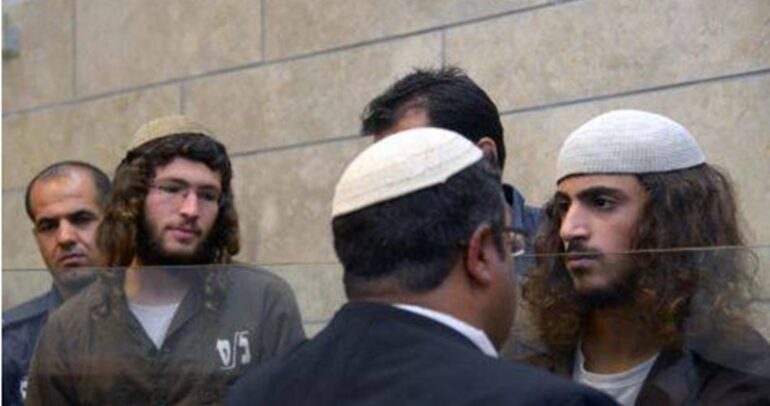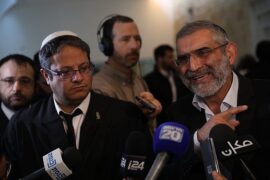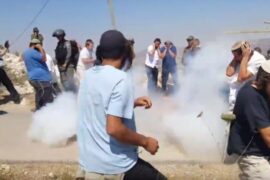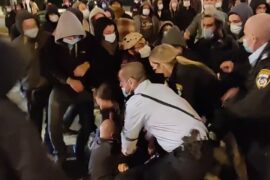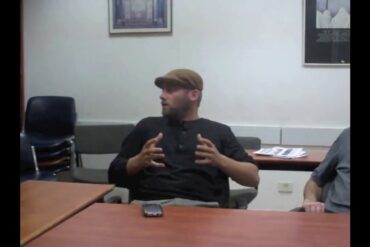The Central District Court in Lod ruled on Tuesday that confessions extracted by means of physical torture from the main defendant in the 2015 arson murder of three members of the Palestinian Dawabsheh family in Duma, as well as a minor charged in the affair, were not admissible.
During the hearing, the judge said that “the use of the [excessive] means (the state’s euphemism for torture) severely violated the rights of the defendants.”
While the confessions made under torture by the adult defendant, Amiram ben-Uliel, were rejected by the court, other confessions, which the court ruled were “given voluntarily” during interrogations without physical pressure, were deemed valid.
Regarding the “trick” pulled on the accused minor by his interrogators, placing him inside a replica of a prison amidst fake violent prisoners who threatened his life, the court ruled the method legitimate, siding with the prosecution which argued that no actual threats had been made against the suspect in that scenario.
The State Prosecutor’s Office, whose job has just been made very difficult by Tuesday’s ruling, announced that the trial would continue.
Attorney Tzion Amir, who represents the minor, said following the court’s ruling regarding his client that “the prosecution will have no choice, it will have to cancel the indictment.”
The Israeli branch of the Physicians for Human Rights organization also welcomed the ruling, stating: “We welcome the court’s decision to reject the use of torture by the Shabak in this investigation. It would be appropriate that a statement in this spirit should appear in court rulings in cases with a lower media profile, even when the tortured suspects are Palestinians. This is a legally and morally corrupt practice that is contrary to international law.”
On that point, the State Prosecutor’s Office warned that if the court adopts the defendants’ claims about torture, it would make it difficult to prosecute Palestinian detainees in the future and may even lead to appeals of previous convictions.
The minor’s father responded to the ruling, stating: “We are pleased that justice was done and the court ruled that our son had nothing to do with the story of the Duma incident. The court’s decision confirms what we claimed all along, that our son was severely tortured during the interrogations.”
“In addition to the court’s determination that our son’s free will was taken away,” he continued, “the torture caused him post-traumatic phenomena that he suffers to this day. We are steadfast in our demand for an immediate and independent commission of inquiry to investigate the torture and the legal approval given to them.”
“We demand the immediate release of our son from his harsh detention and from the absolute isolation in which he lives today. These are the most difficult conditions in the State of Israel.”
While justice must be obtained for the Dawabsheh family, the state and its institutions need to be held accountable. In a democratic society, administrative detention and torture cannot be go-to methods for solving crimes, no matter how terrible. These methods of investigation are especially abhorrent when directed against minors.
Aside from a potentially urgent “ticking bomb” situation that demands extra-legal interrogation techniques to save lives in real time, these methods are completely indefensible and undermine Israel’s claim to hold democratic values.
Right-wing political leaders like Naftali Bennett (Bayit Yehudi) have attempted to claim that the Shabak’s methods are effective and that it’s hypocritical to support these measures for Palestinian prisoners but oppose them when it comes to Jews suspected of political violence.
While it’s true that Israel’s national-religious sector, that Bennett represents politically and to which ben-Uliel and his underage co-defendant belong, should ask itself how turning a blind eye towards these methods of interrogation when directed against Palestinians has ultimately led to them being used against its own youth (perhaps a clear example of how the occupation corrupts Israeli society), we reject the claims that the Shabak’s methods are effective.
Israel’s methods of combatting Palestinian political violence has not decreased support for such violence within Palestinian society. In fact, the opposite is true. And if we see a disparity between the treatment of Jewish and Palestinian prisoners by our security forces, we should correct that disparity not by lowering the moral standard for how we treat Jewish prisoners but by raising the moral standard for how we treat Palestinians. Those seeking an Israel that represents true Jewish and democratic values should oppose these methods, whether directed against Jews or Palestinians (the only difference between them in this case is that the Jews in question were assumed to enjoy the protections of citizenship in a democratic state).

